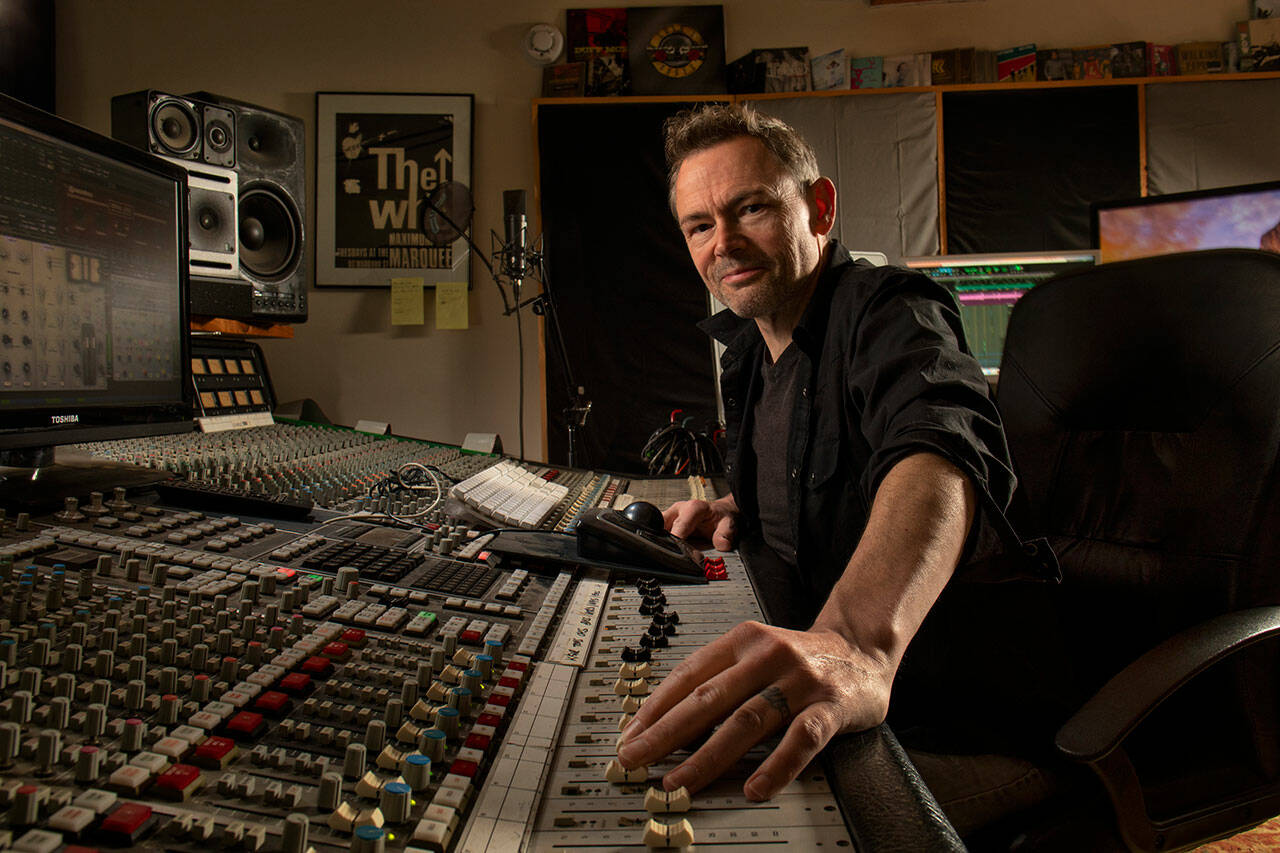Martin Feveyear is a painter of sound.
Wielding his “brushes” — the microphones and buttons, knobs, and faders of a mixing console — in recording studios and performance venues at home and abroad, he blends strings, horns, percussion and voice into finished works that resonate inside your chest and make you want to move, to sing.
This might sound like a pretty high-flown metaphor for a rock-and-roll guy who started singing, songwriting and recording in his native England at age 15, but touch it up with the psychological and musical toolkit helpful to anyone who works with a wide range of musicians and you have a postage-stamp description of what it means to be a record producer and mixer.
“Most artists have expectations and visions for their music, some realistic, and some often not,” Feveyear said. “For me, job one is holding up the mirror, informing the artist about what they are really creating, then guiding and shaping the elements recorded at each point in the process to achieve that vision.”
Feveyear helps them bring their songs to life, whether that means songwriting help, key changes, focusing arrangements, or suggesting lyrical edits.
He came to the U.S. in 1992 at the request of the Screaming Trees, who had been touring Europe with Nirvana and were heading out again with Alice in Chains. He’s produced and mixed music for artists like REM, The Presidents of the United States of America, and Queens of the Stone Age; he’s produced Americana with Brandi Carlile, folk with The Lumineers, hip hop with Blue Scholars and Common Market and many, many more.
Here on Vashon, his list includes Pete Droge and Elaine Summers, St. Ophelia, Sarah Christine, John Browne, Greg Curry and Tim Couldn’t Make It.
Right now, he’s working on three albums with Duff McKagan, of Guns N’ Roses.
Back in 2000, when he was in California working with The Presidents and Sir Mix-A-Lot, they took a break at a fancy pool hall across the street. That’s where he fell in love “at first sight” with future wife Melissa Feveyear, in a meet-cute worthy of the movies.
Now, Melissa owns Terra Bella Flowers in Greenwood, in Seattle — focusing solely on organic, sustainable and locally grown flowers. She was also instrumental in starting the Seattle Wholesale Growers Market in Georgetown.
But as a sideline, she’s also involved in one of Martin’s projects — singing backup in his popular “Bowie Idol and the Vashinas, ” a parody/tribute band he originally put together for an 80s night at the Black Cat Cabaret.
Martin’s performing chops were developed at the London Academy of Music and Dramatic Arts, where he learned to be playful with both ideas and execution. That led him to compete in —and win — the Seattle Elvis Open Invitational over 21 other contestants.
“After Bush’s reelection in 2004, I dressed my Elvis in drag and put together a political commentary show called ‘Elvizabeth the First, Queen of Rock and Roll.’ That was so much wicked fun, I might do it again some day,” he said.
Martin and Melissa moved to Vashon with their kids in 2015. Why? “For the orgies,” he says with a (playful) laugh. “Well, okay, it was the skyrocketing overhead at the studio I owned in Seattle and the increasingly awful traffic. I wanted to spend more time with my family and less time working to meet those demands. We knew a few people on island, and the way that number of wonderful friends has mushroomed has, been a huge and unexpected bonus.”
If you’re a fan of island music you’ve doubtless seen Martin wearing one of his many other hats — either performing, working behind the mixing console at a local concert or consulting with the Vashon Theater, VCA, Open Space, the Black Cat and others about acoustics and equipment.
When discussing how tricky it can be for performers, producers and spectators to protect their hearing, he said, “I wear ear protection everywhere except for when I’m working with music. So many artists and audience members start losing their hearing as the years go by, it’s vital I keep mine as long as I possibly can. The loudness and tonality of a show depends on a myriad of factors, many of them often out of your control as an engineer — from the acoustical issues of the room, the limitations of the equipment, to the sounds and performance abilities of the band.”
Martin added that those who work in the music industry are always at the mercy of the loudest thing that comes from the stage, which is usually the drums.
”The vocals need to be intelligible and natural above those drums, then against that, everything else has to be shaped, balanced and constantly addressed to create a full, connected and enjoyable sound,” he said. “It can be extremely challenging, no matter if you’re in the recording studio, a concert hall or a small room. I relish it though, it’s the thing I love to do and have done my entire adult, fortuitous life.”


